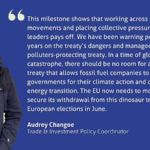The European Commission’s proposals for the EU’s contribution to the Paris Climate Summit announced today advocate for a strong, legally binding outcome of the international climate negotiations. On behalf of over 120 organizations, Climate Action Network Europe welcomes the push for the legal form, but calls for more clarity on the amount of greenhouse gasses the EU will emit between 2021 and 2030.
“Legally binding outcome of the Paris negotiations will provide greater certainty that countries deliver their commitments” – Wendel Trio, Director of Climate Action Network Europe said. “At the same time, the Commission does not specify Europe’s contributions to bridging the gaps in international climate finance and short-term emission reductions. Without addressing these, getting any deal in Paris will be very difficult”.
An important chapter of the Commission’s proposal is the elaboration of the EU’s post-2020 emission reduction target to be submitted to the UN by the end of March, the so-called Intended Nationally Determined Contribution (INDC).
“The amount of greenhouse gases that the EU will be allowed to emit after 2020 remains unclear” – Trio added. “The proposal does not close potential loopholes which can dilute the EU’s 2030 emissions reduction target by up to 4,5%, according to conservative estimations. Given emissions are projected to be at minus 25% in 2020, if reductions in 2021 start from minus 20%, the Member States will not have to make any efforts in the first years. Moreover, using the weak accounting rules for the forestry sector would prolong the functioning of coal power plants. This is not acceptable. It will be now more difficult to expect other major emitters to provide transparent commitments”.
CAN Europe regrets that the Commission has not indicated how the EU could move beyond 40% domestic emission reductions. For the EU’s contribution to be truly equitable and adequate, it should aim to reduce its greenhouse gas emissions by at least 95% by 2050. This means that emissions need to be reduced by at least 55% by 2030.
CAN Europe urges Member States to improve the Commission’s proposal.



